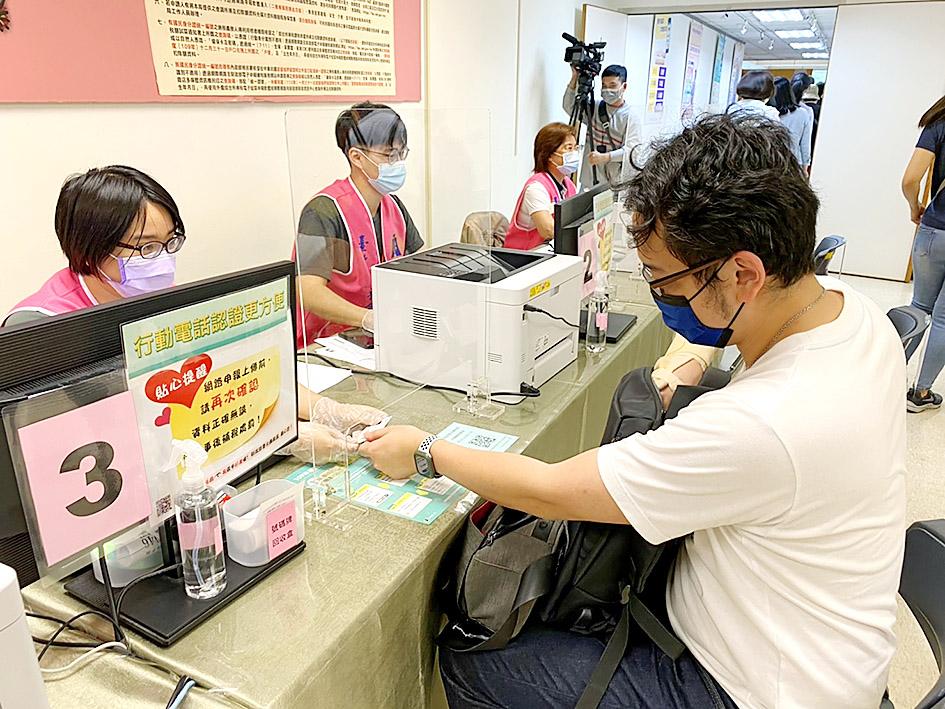The national treasury last month collected NT$293.2 billion (US$10.58 billion) in tax revenue, an increase of 28.5 percent from a year earlier, as all tax categories posted strong gains on the back of economic improvement, the Ministry of Finance said yesterday.
Corporate income tax revenue soared 52.3 percent to NT$21.6 billion, while personal income tax revenue increased 17.8 percent to NT$29.4 billion, the ministry’s monthly report showed.
The gains were due to companies and individuals filing income taxes before a moratorium amid a COVID-19 outbreak was introduced last month, Department of Statistics Deputy Director-General Chen Yu-feng (陳玉豐) told an online news conference in Taipei.

Photo: Allen Wu, Taipei Times
The ministry extended the deadline for tax filing from Monday last week to June 30, after health authorities on May 14 raised the nationwide COVID-19 alert to level 3 and urged people to stay home.
The ministry introduced the same respite last year to give companies and individuals affected by the health crisis more time to tackle the financial burden, Chen said, adding that the comparison base was therefore relatively low.
Local firms in a variety of sectors posted profit growth this year, thanks to inventory-building demand propelled by expectations that the world is to emerge from the COVID-19 pandemic later this year.
Business tax revenue increased 19 percent to NT$85.5 billion, while sales tax revenue jumped 36 percent to NT$17 billion, the ministry said.
The government’s business climate monitor has flashed “red” for the past three months, reflecting a boom in Taiwan’s export-focused economy.
Securities transaction tax revenue grew more than twofold to NT$29.4 billion as daily turnover spiked to a record NT$578.1 billion, Chen said.
Day trading in the past few weeks contributed more than 30 percent, Taiwan Stock Exchange data showed.
Land increment tax revenue increased 25.3 percent to NT$10.9 billion, as the number of taxable cases rose 32.3 percent to 64,525, Chen said.
The robust showing suggested active trading, she said, refuting speculation that the trend was linked to an increase in selling pressures due to upcoming property tax increases.
Starting next month, houses — including presale contracts — resold within five years of purchase are subject to taxes of 35 to 45 percent, in line with the government’s effort to curb short-term property speculation.
Housing transactions picked up in New Taipei City, Taoyuan, Hsinchu, Tainan and Kaohsiung, Chen said, citing government data.
For the first five months of this year, tax revenues totaled NT$893.2 billion, a 19.4 percent increase from the same period last year and ahead of the budget schedule by 13.1 percent, the ministry said.

South Korea’s equity benchmark yesterday crossed a new milestone just a month after surpassing the once-unthinkable 5,000 mark as surging global memory demand powers the country’s biggest chipmakers. The KOSPI advanced as much as 2.6 percent to a record 6,123, with Samsung Electronics Co and SK Hynix Inc each gaining more than 2 percent. With the benchmark now up 45 percent this year, South Korea’s stock market capitalization has also moved past France’s, following last month’s overtaking of Germany’s. Long overlooked by foreign funds, despite being undervalued, South Korean stocks have now emerged as clear winners in the global market. The so-called “artificial intelligence

NEW IDENTITY: Known for its software, India has expanded into hardware, with its semiconductor industry growing from US$38bn in 2023 to US$45bn to US$50bn India on Saturday inaugurated its first semiconductor assembly and test facility, a milestone in the government’s push to reduce dependence on foreign chipmakers and stake a claim in a sector dominated by China. Indian Prime Minister Narendra Modi opened US firm Micron Technology Inc’s semiconductor assembly, test and packaging unit in his home state of Gujarat, hailing the “dawn of a new era” for India’s technology ambitions. “When young Indians look back in the future, they will see this decade as the turning point in our tech future,” Modi told the event, which was broadcast on his YouTube channel. The plant would convert

‘SEISMIC SHIFT’: The researcher forecast there would be about 1.1 billion mobile shipments this year, down from 1.26 billion the prior year and erasing years of gains The global smartphone market is expected to contract 12.9 percent this year due to the unprecedented memorychip shortage, marking “a crisis like no other,” researcher International Data Corp (IDC) said. The new forecast, a dramatic revision down from earlier estimates, gives the latest accounting of the ongoing memory crunch that is affecting every corner of the electronics industry. The demand for advanced memory to power artificial intelligence (AI) tasks has drained global supply until well into next year and jeopardizes the business model of many smartphone makers. IDC forecast about 1.1 billion mobile shipments this year, down from 1.26 billion the prior

People stand in a Pokemon store in Tokyo on Thursday. One of the world highest-grossing franchises is celebrated its 30th anniversary yesterday.